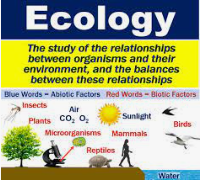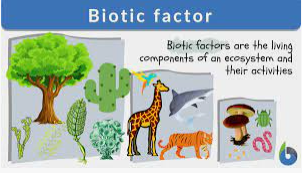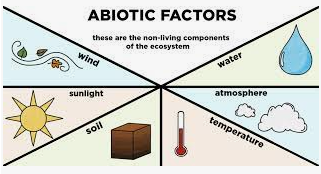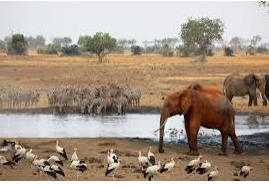What is Ecology, its Types and Components
What is Ecology?
Ecology is a branch of science that encompasses anthropology, population, community, ecology, and biology. Ecology is the study of organisms, their environment, and how organisms interact with each other and with their environment. It is studied at many levels, including biological, population, communities, biotic and ecological.
The main goal of ecology is to improve the understanding of biological processes, adaptations and habitats, interactions and biodiversity.

Let’s take a closer look at the environmental stories presented here and examine the ecological concept.
Also Read:
- Disaster Management, Prevention and Mitigation
- Eco-Friendly Energy
- Environmental Development and Sustainability
Biotic and Abiotic Factors
The main goal of ecology is to understand the distribution of biological and biological factors of living organisms in the environment. Biological and biological factors include living and non-living factors and their interactions with the environment.
Biotic Factors
Biological elements are the living elements of an ecosystem. Some examples of biological compounds are bacteria, birds, fungi, plants, and others.

Abiotic Factors
Abiotic compounds are inanimate and physicochemical factors of ecosystems. These elements are available from the lithosphere and hydrosphere. Examples of abiotic compounds are sunlight, soil, air and moist minerals.
Living organisms are grouped into biotic components, whereas non-living components like sunlight, water, topography are listed under abiotic components.

Types of Ecology
There are different types of the Ecology are described below:
Global Ecology
It is about the interactions between the ecosystems of the earth, the earth, the air and the sea. Helps understand key interactions and their effects on the planet.
Landscape Ecology
It is about trade in energy, materials, fauna and other biological products. The environment explains the impact of human influences on structures and functions.
Ecosystem Ecology
It deals with the whole environment, including the study of living and non-living things and their relationship to the environment. This scientist studies how nature works, their interactions, and so on.
Community Ecology
This is how the structure of the village changes through the interaction between living beings. An ecological community with two or more populations of different species living in a defined geographical area
Population Ecology
We are talking about factors that affect the reproduction of genes and populations in the body. Environmental researchers are interested in population variability, population growth and all other interactions with a population.
In biology, a population can be defined as a collection of individuals of the same species living in a particular place at a given time. Births and migration are the main factors of population growth, while death and migration are the main factors of population decline.
The environment measures the size of the population and the size of the population. Population is the number of people in a tumor or area. This helps determine if a particular species is endangered or needs to monitor its statistics and replenish resources.
Organismal Ecology
Organic ecology is the study of behavior, morphology, physiology, etc. individual organizations in response to environmental challenges. It examines how individual organisms interact with biotic and abiotic components. Ecologists study how organisms adapt to these non-living and living components of the environment.
Individual species are associated with different adaptations, such as physiological adaptations, morphological adaptations and behavioral adaptations.
Molecular Ecology
Ecological studies focus on protein production and how these proteins affect the organism and its environment. It occurs at the molecular level.
DNA makes proteins that interact with each other and with the environment. These interactions create complex organisms.

Importance of Ecology
The following factors explain the importance of ecology:
Conservation of Environment
Ecology helps us understand the impact of what we do on the environment. Show people how much damage we are doing to the environment.
Lack of knowledge of ecology has led to soil and environmental degradation. It has also led to extinction and disaster for some species. For example, dinosaurs, white sharks, mammoths and others. Therefore, the study of the environment and living things helps us to protect them from all dangers and dangers.
Resource Allocation
By knowing the ecology, we can know what resources different organisms need to survive. Lack of environmental education leads to scarcity and scarcity of these resources and competition
Energy saving
All organisms need energy to grow and develop. Lack of understanding of the environment leads to overuse of energy sources such as light, food and radiation leading to exhaustion.
A good knowledge of the environmental requirements prevents the consumption of unnecessary energy sources and thus saves energy for future purposes.
Eco-Friendliness
Ecology promotes harmonious life within a species and a lifestyle that preserves the habitat.

Examples of ecology
Here are some examples of ecology:
Human Ecology
It concerned with the relationship between people and the environment. It charts the impact of people on the environment and gives us insight into how we can improve people and the environment.
Niche Construction
It examines how organisms change the environment of themselves and other organisms. For example, termites create six-foot mounds in food while protecting the entire population.
For more information about the environment, its importance and the type of environment, please visit the BYJU website or download the BYJU application for more information.
Frequently Asked Questions
Q1: What is ecology?
Ans: Ecology is a field of science related to the relationships between organisms and the physical environment.
Q2: What are the different levels of ecology?
Ans: Different levels of ecosystems include organisms, communities, populations, and ecosystems.
Q3: What is the type of ecology?
Ans: Different types of ecology include molecular ecology, biological ecology, population ecology, community ecology, global ecology, landscape ecology, and ecological ecology.
Q4: How does ecology relate to evolution?
Ans: Ecology plays an important role in the formation of new species and the modification of existing ones. Natural selection is one of many factors that influence evolutionary change.
Q5: Who coined the word ecology?
Ans: Ecology was first invented by the German zoologist Ernst Haeckel. However, ecology has its origins in other sciences, especially geology, biology, and evolution.
Q6: What is life ecology?
Ans: Habit ology is the type of natural environment in which a particular species of organism lives and is characterized by both physical and biological features.
Q7: What is a niche?
Ans: Organisms that have access to all biological and abiotic resources that can survive and reproduce without interference from other species are known as their fundamental niche.